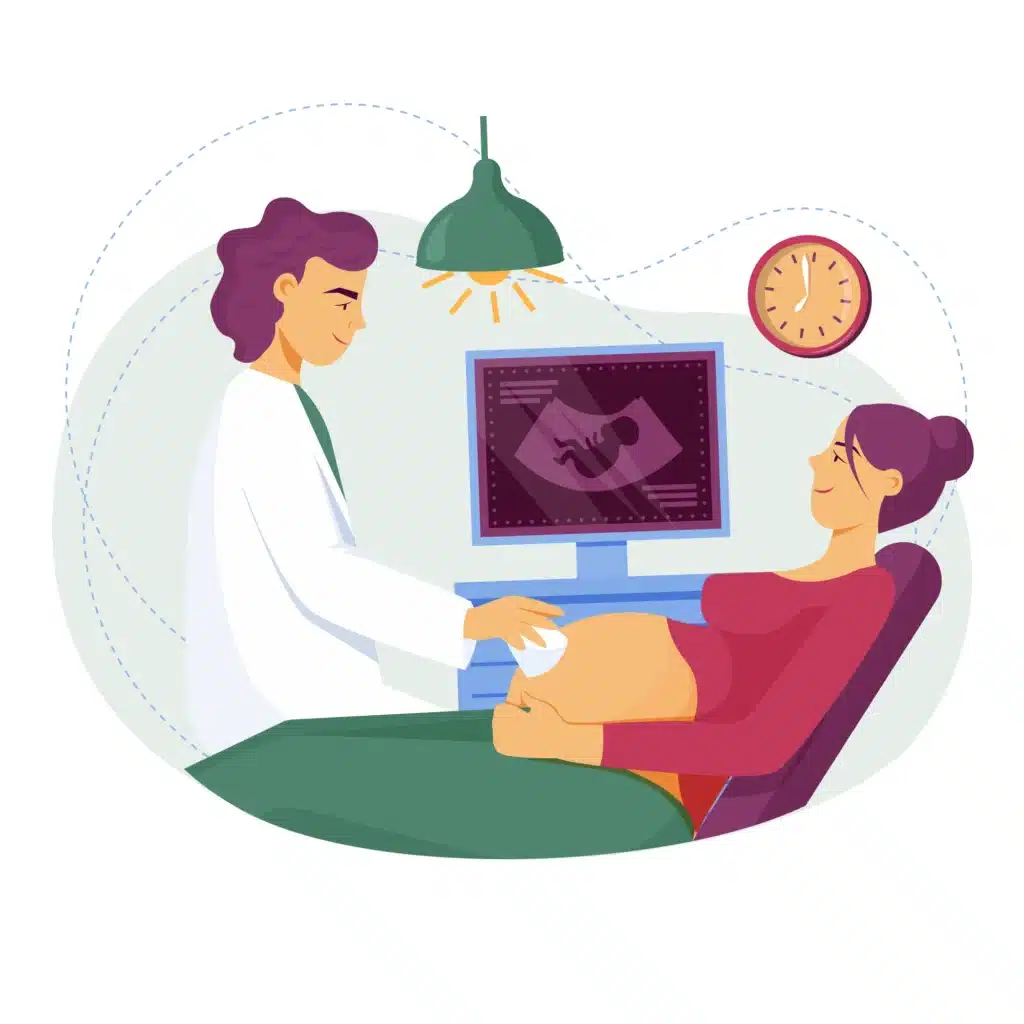Parenthood is a remarkable journey filled with heartwarming moments. One such cherished experience is feeling your baby move inside the womb. It’s an exciting and reassuring feeling that strengthens the bond between parents and their little ones.
But what happens when you notice decreased foetal movement? It can be a cause for concern and leave you wondering what steps to take.
In this article, we will guide you on the causes of decreased foetal movement and what to do when you’re experiencing it.
So, let’s dive in and find out what you need to know.
When Does Foetal Movement Begin?

Foetal movement usually begins between 18 and 25 weeks of pregnancy.
Initially, the movements may be subtle and easy to miss, but they become more pronounced as your pregnancy progresses.
What Does a Foetal Movement Feel Like?
Foetal movement can feel like gentle flutters, rolls, or kicks.
As your baby grows, you may also feel hiccups or stretches. Each woman’s experience of foetal movement may vary.
Reasons for Decreased Foetal Movement
There are several reasons why foetal movement may decrease. Here are three common ones.
1. Sleep Patterns
Like adults, babies have periods of sleep in the womb. Movement during those times will obviously be reduced.
2. Position
If the baby is positioned with their back against its spine or facing the placenta, it may be more challenging to feel its movements.
3. Gestational Age
As your pregnancy progresses, the baby has less room to move around, which can lead to a perceived decrease in movement.
How Long Should You Wait to Go to the Hospital if Your Baby Isn’t Moving?

If you notice decreased foetal movement, it is important to trust your instincts and seek medical attention promptly.
If you experience fewer than ten kicks within two hours, it may signal decreased movement of the baby.
Contact your doctor if you experience a significant decrease or absence of movement over a certain period, typically within 24 hours.
How to Increase Foetal Movement?
If you are concerned about decreased foetal movement, there are a few steps you can take to encourage your baby to move.
1. Change Positions
Shift your body position or lie down on your left side. Sometimes, this can help stimulate movement.
2. Eat or Drink Something Cold
Consuming a small snack or a cold beverage can sometimes elicit a response from your baby. While many mothers have reported this, the evidence for this isn’t very strong.
3. Gentle Movement
Engage in gentle activities like walking or rocking in a chair. The rhythmic motion can often encourage foetal movement.
4. Relaxation Techniques
Put your body at ease and practise deep breathing or gentle stretching exercises. A calm and relaxed state can create a favourable environment for your baby to move.
Is Your Child at Risk if There is Decreased Movement?
While decreased foetal movement can sometimes be a cause for concern, it does not necessarily indicate immediate danger.
Ideally, if you feel at least ten kicks or movements within an hour or 20 kicks within two hours, everything is probably fine.
However, we recommend consulting a doctor if you notice fewer movements to rule out any potential issues.
What Will the Hospital Do in the Event of Decreased Foetal Movement?
When you visit the hospital for decreased foetal movement, your healthcare provider will evaluate the baby’s well-being.
This may involve monitoring the baby’s heart rate, performing an ultrasound, or conducting other tests as necessary.
Visit The Best Maternity Hospital: Ayu Health
When it comes to specialized maternity care and expert guidance, Ayu Health is a top choice for expectant parents.
With our comprehensive range of services, we prioritize the well–being of both mother and baby throughout the entire pregnancy journey.
Our team of expert doctors and medical staff have extensive experience in the field of maternity care and keep abreast with the latest advancements in medical practices.
Concerned about decreased foetal movement? Let us help you. Contact +91 6366-100-800 to book an appointment or visit our website for more information.
FAQs
Why Hasn’t My Baby Moved in 5 Hours?
Your baby hasn’t moved in five hours either because they’re asleep or do not have room to move around. It’s not uncommon for babies to have periods of reduced activity lasting a few hours.
How Long Is Too Long Without Foetal Movement?
No movement within 2 hours is too long without foetal movement. At this stage, it’s advisable to contact your doctor promptly.
Should Babies Move Every Hour?
Babies do not have a set pattern for movement. However, they should have active periods throughout the day. If you notice fewer than 10 kicks within 2 hours, seek medical attention.
When Should I Start to Feel the Foetal Movement?
Most women begin to feel foetal movement between 18 and 25 weeks of pregnancy.
Also Read : Low Blood Pressure in Pregnancy: Causes, Symptoms, and Management
Our Hospital Locations
Gynaecology Surgery Hospitals in Chandigarh | Gynaecology Surgery Hospitals in Bangalore | Gynaecology Surgery Hospitals in Jaipur | Gynaecology Surgery Hospitals in NCR | Gynaecology Surgery Hospitals in Hyderabad
Our Doctors
Gynaecology Surgery Doctors in Chandigarh | Gynaecology Surgery Doctors in Bangalore | Gynaecology Surgery Doctors in Jaipur | Gynaecology Surgery Doctors in NCR | Gynaecology Surgery Doctors in Hyderabad
References:
https://www.ncbi.nlm.nih.gov/pmc/articles/PMC4888620/
https://bmcpregnancychildbirth.biomedcentral.com/articles/10.1186/s12884-016-0922-z
https://my.clevelandclinic.org/health/articles/23497-kick-counts
https://ayu.health/blog/explaining-the-difference-between-sonography-and-ultrasound/
About the Author





